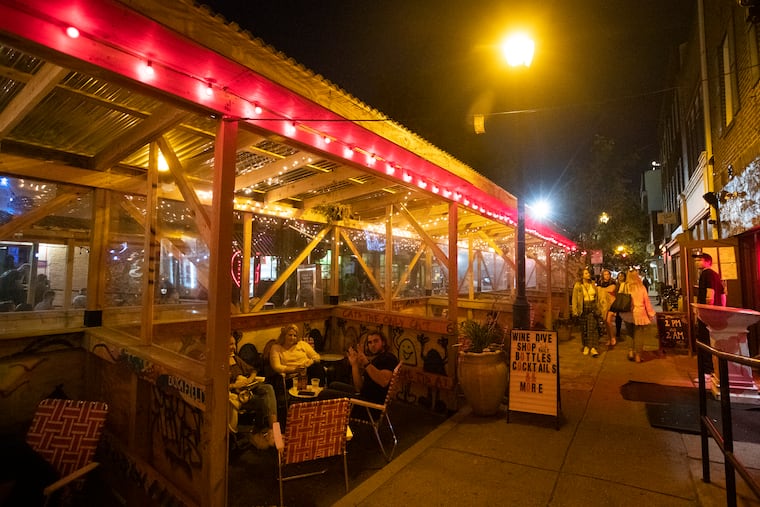Streeteries put our lives at risk | Opinion
By permanently filling up our city’s sidewalks, Philadelphia would effectively be telling the disability community that our needs matter less than restaurateurs’ ability to make a buck.

When the COVID-19 pandemic roared into Philadelphia last year, the city had no choice but to close down businesses for three months to keep our community safe. As the city slowly began to reopen, allowing sidewalk dining and the construction of streeteries was an excellent decision to help Philadelphia’s restaurants stay alive.
However, we strongly urge City Council to vote no on two new measures, proposed by Councilmember Allan Domb, to turn this temporary survival tactic into a permanent one. Domb’s suggested legislation does not take into account all of the negative factors outdoor dining has on pedestrians, especially people like us who are elderly and/or have disabilities.
Prior to the pandemic, the sidewalks, crosswalks, and streets of Philadelphia already were in deplorable conditions and failed to be in compliance with the Americans with Disabilities Act (ADA), as noted in a lawsuit filed against the city in August 2019.
Sidewalk dining poses major problems for pedestrians, especially when tables and chairs are set up along the restaurant wall as well as at curbside. This arrangement often minimizes the distance for pedestrian travel to below the ADA standard. People who use wheelchairs and other mobility aids should not have to play “dodge ‘em” just to roll down the street. People using canes and walkers for stability should not be thrown off balance because the marginalized path of travel is lopsided and/or broken, as is the case on many sidewalks with new outdoor dining. Blind Philadelphians should not have to find themselves apologizing to strangers at outdoor tables because, if they happen to teeter on these cluttered sidewalks, their white canes may not touch the frame of a chair before their bodies brush against an outdoor diner.
In addition to the challenges posed by the streeteries themselves, there are also collateral challenges created by an increase in outdoor dining. With parking and loading zones often eliminated to make room for the large structures, truck drivers are forced to pull into crosswalks in order to make deliveries, blocking access to curb cuts, a vital tool for anyone who has mobility issues. Additionally, drivers often leave their trucks running while making deliveries. People with visual disabilities depend on their hearing to make their decisions about when it is safe to cross an intersection. Idling truck engines make it impossible for pedestrians to cross in a safe and timely manner. And wheelchair users find themselves stuck at intersections waiting for the truck driver to pull out before they can access the curb cut to cross.
» READ MORE: People with disabilities say outdoor dining is making it hard to get around in Philly: ‘There is no room for us’
These are not minor inconveniences. People with disabilities deserve the right to maneuver throughout the city with as much ease as able-bodied people. When sidewalks and curb cuts are blocked or rendered unusable, we face the same challenges as everyone else: We’re late to work or to appointments or to visit our families and friends. But we also risk getting seriously injured. Our lives depend on having clear, easy-to-navigate pathways. By permanently filling up our city’s sidewalks, Philadelphia would effectively be telling the disability community that our needs matter less than restaurateurs’ ability to make a buck.
City Council, please look at the big picture. We all need to pitch in and help sustain our economy, however, it can’t happen if your constituents cannot reach these venues via a safe, accessible path of travel. Please vote no on any legislation that would make streeteries permanent.
Fran Fulton, who is blind, and Michelle McCandless, who uses a wheelchair, are disability rights advocates in Philadelphia with ADAPT, the national disability rights group. They both live in Center City.